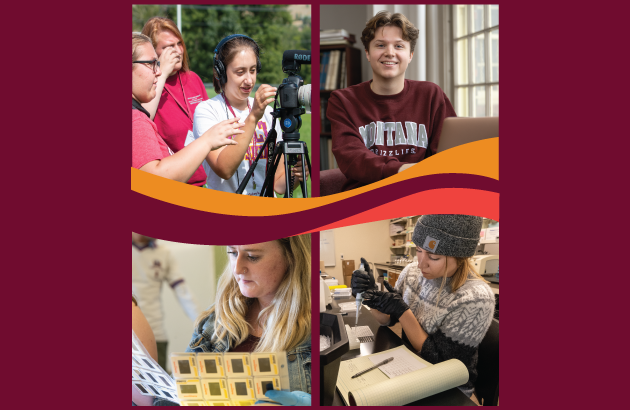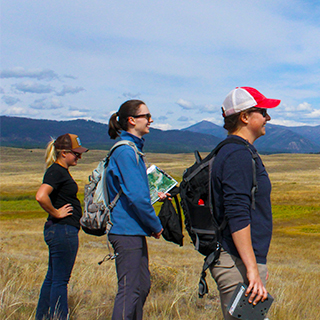Internships
Here at the ELCS, we want students to know that it's never too early to start thinking about internships! Internships can help you explore your personal and professional interests, try out different career options, and network with professionals. Stop in today, and our team can help you find an internship, connect with a faculty advisor, and earn academic credit.


INTERNSHIPS AT UM
Internships are work-based learning experiences related to your career journey and are an impactful part of helping you achieve your goals and jump-start your future. Internships can be paid or unpaid, full-or-part-time, and generally occur during academic semesters. You can also earn academic credit for completing an internship, but this is not required by the university.
Internship Links

Internship Procedure
First Steps
-
Make an appointment with a Career Coach
-
Create your resume, cover letter, and Handshake profile
-
-
Research and review company websites for established internship programs
-
Explore your options for work, volunteer, and intern abroad
-
Connect with professionals in your field through social media and LinkedIn
-
Ask professors, professionals, peers, and parents about potential internships
Where to Find Internships
- Handshake (UM's platform to find internships and jobs)
- Volunteer Missoula
- Applying for an Internship Help Sheet
Types of Internships
Internships can be paid or unpaid, full-or-part-time, and generally occur during academic semesters. You can earn academic credit--or not!
Paid Internships
These include an hourly wage, stipend, travel allowance, or salary.
Unpaid Internships
Unpaid internships are often the norm for some nonprofits and public service agencies; although corporate employers sometimes offer these types of opportunities. When entering an unpaid internship with a for-profit organization, be aware that those organizations have a responsibility to pay interns if the position meets federal guidelines.
Internships are all different; however, they are all tailored to fit specific academic and career goals. Compensation, estimated total hours, location, work setting, and duration vary by the employer, your major, and your personal goals.
Internships for Credit
Some academic departments require students to participate in an internship. Other programs may encourage it or even allow you to apply your internship credit toward your major. Credit-bearing internships require a faculty advisor to grant credit and may require academic work to earn a grade.
Credit-bearing internships must be reported.
Non-Credit Internships
A faculty advisor is not necessary for a non-credit-bearing internship.
Learning objectives detail what you desire to learn as an intern. They are tied to the position description and are used to ensure the effectiveness of the internship. Talk with your Internship Supervisor to identify and document 3-6 learning objectives focused on your academic studies and career goals. For instance, what do you want to experience, learn, create, or understand? What skill or insight do you want to gain, enhance, or develop? What career readiness skills do you want to demonstrate, polish, or strengthen? What activity do you hope to participate in? If you need assistance, contact ELCS 406-243-2022 or schedule an appointment with a Career Coach or Experiential Learning Coordinator. We are available to help.
-
Academic departments determine what constitutes an internship worthy of academic credit. Check with your department or faculty advisor regarding internship requirements specific to your academic program.
-
Faculty internship advisors are responsible for overseeing a student’s academic progress throughout the internship and awarding academic credit for their work.
-
Discuss Learning Objectives (3-4 goals) for your internship with your faculty advisor. These are designed to ensure you are applying your academic knowledge to your internship and your internship is positively supplementing your academic progress.
-
In addition to the vocational work for your internship, you may be required to do other work for your academic department. This work will be assigned by your faculty advisor and may include assignments such as a paper, a portfolio, a poster presentation, etc.
-
Depending on the dates of the internship, students may register for internship credit in a semester other than the one the internship took place; however, the two should coincide as much as possible. Some departments do not allow this. Discuss options with your faculty advisor.
-
An Experiential Learning Agreement must be submitted for all credit-bearing internships. Your faculty will be sent a copy which they will review and approve. This serves as a protective contract for the intern if any unforeseen issues arise during the internship.
-
Only faculty can approve and award internship credit.
-
1 academic credit = 45 hours of work. Some departments may exceed the minimum. (Faculty Senate Procedure #201.35)
-
Credits are assigned under "98" bag number courses (198, 298, 398, 498, 598, 698) in their respective departments.
-
Up to 6 internship credits can be applied toward graduation as either required or elective credit. Some departments may exceed this.
-
Credit can be offered as a Traditional Grade or as Credit/No Credit. Discuss options with your faculty advisor.
-
Credit-bearing internships are offered each semester throughout the academic year.
-
An Experiential Learning Agreement must be submitted for all credit-bearing internships.
-
An override slip signed by the faculty advisor or an electronic override is required for registration in CyberBear.
-
You will need the CRN your faculty provides for your Learning Agreement as well as for registration.
-
International students: There are strict legal requirements for international students seeking work authorization to earn pay using the academic credit option. Consult Bodhi Murphy, International Students and Scholars advisor.
- All credit-bearing internships must be reported
- Information you will need:
- Internship supervisor and faculty advisor contact information
- Registration information
- Learning objectives
- Internship description
- Information you will need:
This is the part of the experience that matters most! Keep in mind that your internship is providing you with valuable skills that you can add to your résumé and apply to your experiences after college.
The Day BEFORE Your First Day
Read the company’s history, annual report, and executive biographies to learn about the company’s achievements, challenges, mission, and values so you can better understand how your contribution will be most meaningful.
Map and travel your morning commute during rush hour. Pin directions on your cell phone. Identify parking locations, parking cost, or necessary parking pass. Find subway, bus, or rail transit route schedules and locations.
Update your cell phone with the company address and main phone number, as well as your supervisor’s number. You may have to Uber to/from an off-site meeting, or need to call in sick if you become ill.
Increase your savings account. If you are an unpaid intern, save enough money to cover your expenses. If you are a paid intern, your first paycheck might take a few weeks (sometimes a month) to arrive.
Apply for the ELCS Scholarship to help support travel and living expenses for your domestic or international internship. For more information, email ELCS at elcs@umontana.edu.
Your First Day
Create a positive first impression. Arrive early and dressed appropriately to set your professional image. Be punctual, reliable, positive, and professional in your written and oral communications.
Review Learning Objectives with your supervisor including performance expectations, goals, and evaluation. Confirm work and lunch hour times; holiday schedules; door key code; email address; work phone number; timecard process.
Bring your driver’s license, social security card or passport to set up your pay (if a paid intern). Bring lunch money, a notebook, an extra copy of your résumé, and any internship paperwork you were asked to sign.
Use surnames to address senior colleagues (Ms. Miller; Mr. Smith) until you have been invited to use first names. To remember colleagues’ names, write them down on a notepad. Your cell phone should be stored.
Tomorrow-proof your career by developing new skills and knowledge. Be open to learning opportunities as learning and skill development comes in many forms in the professional workplace.
Success is a collective endeavor. Network with colleagues and other interns to build a support system. Organizational success is affected by your performance.
Your work colleagues are colleagues not friends. Avoid conversations about salary, religion, politics, and office gossip.
High quality work is superior to a quantity of poor-quality work. Take initiative as you will be appreciated for your energy and fresh perspectives.
Company computers are for company work. No personal emails. Do not share offensive jokes or email inappropriate mimes to colleagues. Do not access sensitive sites via company wi-fi. Do not share your computer with others.
No ghosting at the workday end. Visit with your supervisor to ask if there is anything further to attend to that day, that you could read that evening. This encourages open communication and confirms your desire to learn. Say goodbye.
-
ELCS will send electronic evaluations to the student intern and the internship supervisor 4 weeks before the internship ends.
-
Interns will be asked to evaluate their experience interning at their internship site.
-
Supervisors will be asked to evaluate their student intern’s performance at the internship.
-
Results from these evaluations will be shared with the faculty advisor at the end of the internship.
-
Some (but not all) academic departments use the results from internship evaluations for grading, assessment or accreditation.
-
Data gathered from these evaluations will be used in an aggregate format to assess and ensure the quality of internships conducted through the University of Montana as well as in annual reporting.
